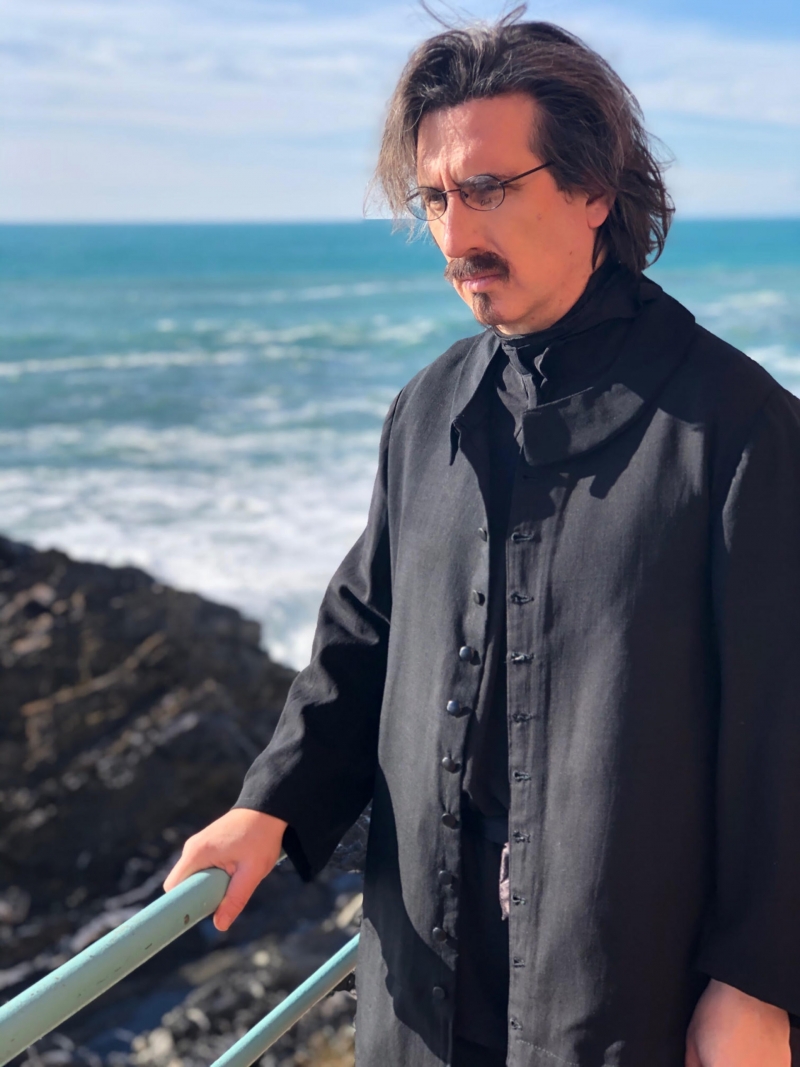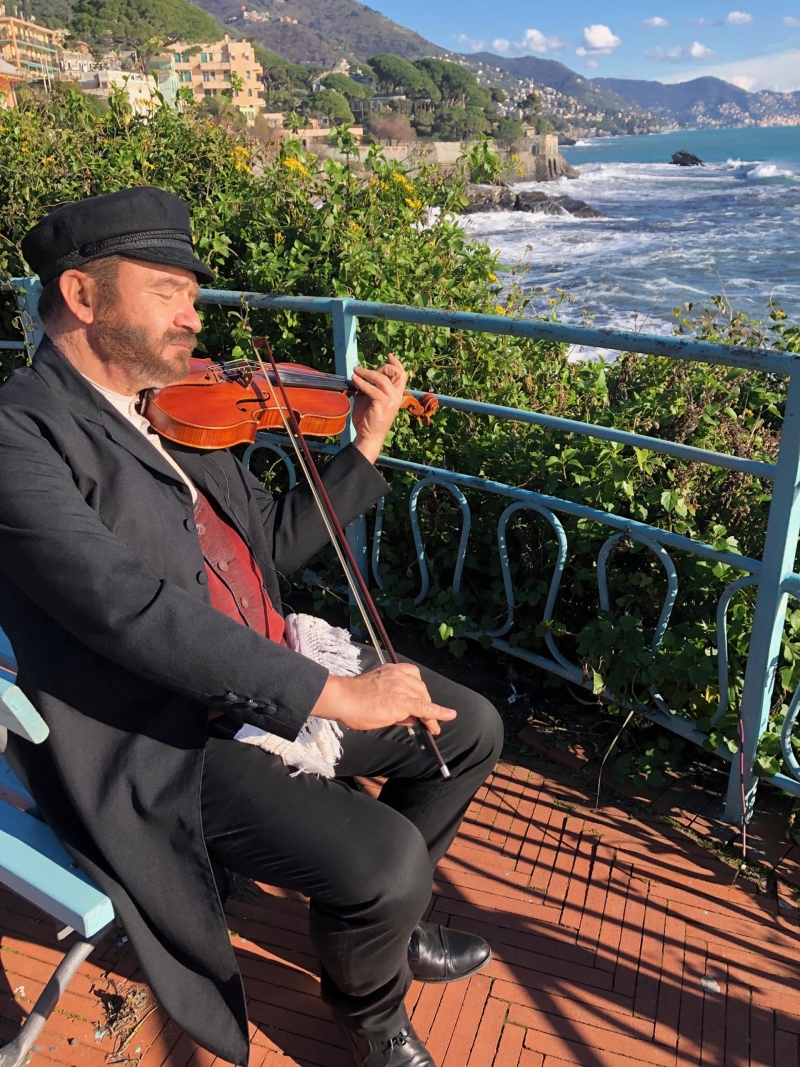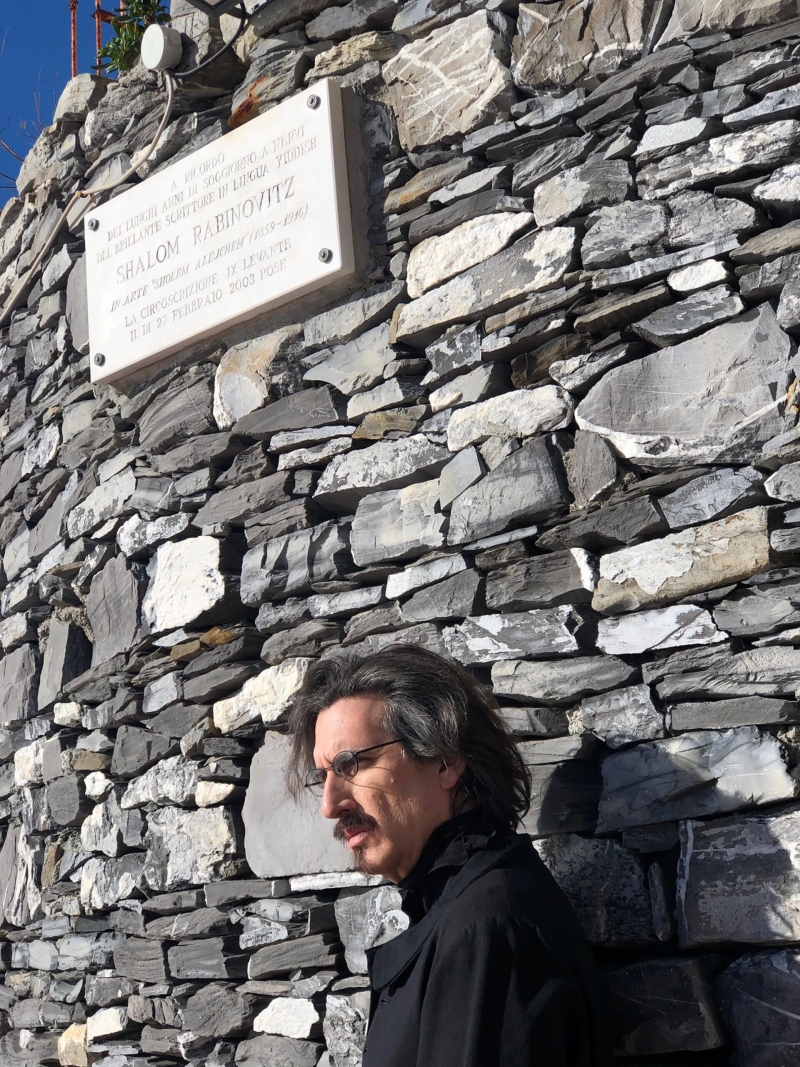Interview: Hershey Felder of BEFORE FIDDLER at TheatreWorks Silicon Valley Brings Seminal Writer Sholem Aleichem to Life
The acclaimed playwright/performer presents a world premiere musical play livestreaming on February 7th.

Good news for Hershey Felder fans and musical theater lovers everywhere! TheatreWorks Silicon Valley is launching the New Year with three world premiere livestreamed performances in partnership with Hershey Felder Presents Live from Florence. First up is Hershey Felder as Sholem Aleichem in BEFORE FIDDLER, presented live at 5pm PST on Sunday, February 7, 2021 (with streaming on-demand access through February 14).
Decades before the megahit musical Fiddler on the Roof first delighted audiences, there was Sholem Aleichem and his beloved character of 'Tevye the Milkman.' Long before songs like "Tradition," "If I Were a Rich Man" and "Sunrise, Sunset" first beguiled audiences, there was klezmer, a music that imitated talking, laughing, weeping, and singing, and where musicians didn't just make music, they spoke to audiences in song.
Acclaimed playwright & performer Felder will play Sholem Aleichem, giving audiences the true story of what happened 'Before Fiddler.' He will be joined by Florence's celebrated Klezmerata Fiorentina, comprised of top musicians from Florence's world-famous Orchestra of the Maggio Musicale. Filmed partially on location where the events actually took place, this production will feature the stories and characters of Sholem Aleichem, along with authentic klezmer music that is sure to move the soul. For more information and to purchase tickets, please visit www.theatreworks.org.
I spoke with Felder last week from his home in Florence where he's been based ever since the Covid pandemic hit. We talked about how he created the new piece, how the material resonates with his own Jewish heritage, and the fun and trepidation he finds in creating and performing his ever more ambitious and complicated livestreams. As always, Felder is fascinating and delightful to talk to, simultaneously brainy and emotionally transparent, and confident enough in his own talents to be open about his enduring fears. The following conversation had been condensed and edited for clarity.
I'm familiar with the name Sholem Aleichem because of Fiddler on the Roof, but I've never actually read any of his work. What was your own introduction to his writing?
Well, I grew up in a Jewish household that spoke Yiddish. We knew his stories and we would read them in Yiddish, and it was the thing you were part of. But of course, my first introduction was a child's production of Fiddler on the Roof with little mini-people in grade 2 and grade 3 singing "If I Were a Rich Man" with hats and coats that were too big, you know? Of course, most people know Fiddler on the Roof, but they don't know the origins of it and they don't know out of what, or who, it was born. It was my interest in getting to that, because I love the character. He's very funny and smart and wise, and it's actually a touching story, his own, so I wanted to tell that story.
You grew up speaking Yiddish at home?
Indeed, I did, yes. My parents are both holocaust survivors - well, after a fashion. My father was a holocaust survivor. My mother's whole family survived, but she was born in '46, so she was the post-holocaust baby. She lived through the Hungarian revolution and then they came to North America. But otherwise, I'm from a family of survivors, so I grew up as a first generation.
This show seems like a bit of a departure for you in that Aleichem wasn't a composer.
Well, he was, after a fashion. He used words, not notes, but...
Do you feel like you're approaching this show any differently because of that?
Well, I think I approach each one of them differently. Some of them are composers who are pianists, some of them are like Bernstein, mostly a conductor who wanted to be a great composer, was a good composer. You have others who are strictly composers and can't really play, like Irving Berlin, or songwriters, like Gershwin, so you have all kinds of things in these characters. You have Tchaikovsky who played piano exceptionally well and composed for one hell of a piano player but was not a concert pianist.
So each one has its own life, its own style, its own way of going about it. And it's also notable to remember that I have played other characters that have not been composers. It's just I've become so known for these composers. Do I go about them all the same? No. I deal with them as individuals, who they are, and go from there.
So who was Sholem Aleichem?
Well, that's his pen name. He was Sholom Nahumovich Rabinovich. He was a writer from Ukraine, from Kyiv. He was born just outside of Kyiv in 1859 and died in 1916 in New York City. When he died, he was considered the Jewish Mark Twain. To which Mark Twain said, "Please let Mr. Aleichem know that I'm the American Sholem Aleichem." Which is very sweet. He was very famous for his writing, but he always had money trouble, never had enough. He created books that were very, very beloved by the Jewish world. When he came to New York, it was quite an experience for him, for the simple reason that so many of the shtetl Jews had come to New York and had moved on. They wanted to become Americanized or New World. He was still writing about the Old World and they kind of weren't interested. Now, of course, the Old World is a fascination for so many. Not to say that he wasn't beloved. In fact, when he died in 1916 in New York, it was the most attended funeral in the history of New York City up until that point. Over 200,000 people lined the streets. Think about that - in 1916, that even [compared to] presidents whose coffins passed through New York, this guy had a bigger funeral. So that's kind of amazing in its own right.

in BEFORE FIDDLER
Will music be an integral part of this show?
Oh, it's completely a whole part of this show. It was the reason for doing it, because I met these klezmer guys [Klezmerata Fiorentina] here in Florence, who are part of the main orchestra, the Maggio Musicale, but they also have a side line of being great klezmer musicians in the old tradition. Their leader, Igor Polesitsky, is a Ukrainian-born violist-violinist. He ended up here after defecting to America in the 80's. He created this group and they've been playing all over Europe and have become quite well-known. I met them and said, "Omigod, we have to do something together. I have just the thing!" [laughs]. So - them and live performance run through the whole thing. It's a lot of fun, and it's authentic klezmer, the real thing, the way it was played 150 years ago in the Ukraine.
You grew up playing classical music, but was klezmer also part of the culture you grew up with?
Of course. I mean, it's every bar mitzvah, every wedding. Certainly, I played at a bar mitzvah or two in my day when I was 12 and 13. But in terms of authentic Ukrainian klezmer? I never studied it, never made a career out of it, which is why it's so wonderful to be with these guys and be able to tell a story. And at one point I play with them, which is a lot of fun.
This show is a world premiere. When you create a brand-new show, how do you begin that process?
[With] as much knowledge as possible about the character. I knew the character I was going to play and I had an idea what I was going to do, but I had to see if the idea would play out. I was lucky because the idea I had fit the puzzle that I wanted to create, and it worked. Miraculously. [laughs] I was gonna set it in Kyiv or one of the places he refers to in the book that I wanted to deal with. I thought, "Sure, I'll be able to use Florence [as a background]. It's old Europe, half of Florence looks like what Kyiv looked like in the 1880's. I can do this, no problem."
And then I made a discovery that when he got very sick in 1907, he ended up for four years in Nervi on the Ligurian coast, about an hour and a half from my house. There's a plaque in Nervi where he used to sit and write. And I thought, "Omigod!" I didn't know this, most people don't, that he ended up from 1908 to 1912 in Nervi. So guess where we're heading on Monday?! We shoot in Nervi, which is gonna be fun, exactly where he spent four years.

Do you have any trepidation about debuting this show as a livestream without the benefit of having toured it around the world first?
Even the ones I've been touring around the world, I've got plenty of trepidation, you know? [laughs] It's a New Medium, it's different. I don't know where the laughs are - I think I know where the laughs are cause everybody laughs when I do it out loud here. But the fact is that I don't know this would even play on a stage because it's written for this, although I think it would. I play so many characters in this one, in such off-the-wall manner, that I'd have to adapt what I'm doing here for the stage.
The trepidation is about delivering the goods to the public. You make them a promise, which is "You spend your money and I'll entertain." That's the contract, and if you don't fulfill the contract, you failed. People make an error in thinking, "Oh, it's about ego, it's about attention." It's not. It's not about whether people like me or not, or like it or not. For anybody who's really serious at this stuff, it's not about that at all. What it's really about is that contract. It's about the idea of people have paid to be entertained, they've not paid to judge you, they've paid to be entertained and you need to entertain them. And that means teaching them something, having fun with them, making them laugh, making them cry, making them feel something, whatever that is. That's the contract.
So, do I have trepidation? Well, always. Because you want to do your best. And you know not everybody's gonna like everything, cause that's the way it is. You can't help that. But what you want to know is that you've put in your best effort to entertain the majority of the people. And if you've done that, then you've done something.
I'm also curious about your process as an actor doing these livestreams. The ending of your Tchaikovsky piece, when he's listening to his Sixth Symphony, was just devastatingly sad. Without an audience to play off of, how do you go to that deeply emotional place?
It's actually easier because you're being much more intimate, rather than having to fill a hall with a thousand people. You have the lens on you, and the lens is capturing every emotion. The idea is to not do too much and not to push too hard and just to be human and real. One of the things that's fun for me, that never happens in the theater, is I get to watch what I've done [afterwards]. There are things you want to do differently and things you want to change and so on and so forth, but the fact of the matter is that I was quite pleased with a lot of that, especially the stuff that's very emotional. If I listen to the music and I take in a sense of the world [the emotion will come].
Because you can't act what Tchaikovsky's going through. That doesn't work. I'm not that kind of actor, I don't believe in beating people up in order to play a murderer, that kind of thing. [laughs] You have to draw on things that create the illusion. For that very deep, emotional Sixth Symphony scene, where he's ripped to shreds and just sits there and cries, he doesn't really do anything. It's just a matter of listening to the music and feeling the kind of pain he must have felt, not trying to be him, but feeling what he must have felt to compose something like that. And if you like music, it's not hard. I think we're suffering so much in the world that it was, I hate to say "easy" cause nothing is easy, but it wasn't such a far thing to find, to dig into that kind of emotion.
After the scene ended, I was like, "Wow! How did he do that?" because I didn't see you working up to the big moment. I'm always annoyed when an actor has a super emotional scene and you can see them just working so hard to get to themselves to that place.
Yeah, that's not acting for me. For me, acting is when ya don't see it, you know? [laughs] It's when you're just allowed to feel it. Before we did all that, I said, "Keep the camera on me and don't move. I don't know what's gonna happen. I'm not gonna force it." And quite frankly, if crying didn't come, then it wouldn't come, and that's it. I have to say, I watched it back and I thought, "Gee, that's effective!" [laughs] It also doesn't look like me, you know? I look like a different person. I actually felt like I was watching someone else. And that made me quite proud, I felt that I'd accomplished something there by being human. Many people told me that it was so emotional and so real because it wasn't pushed. It was just quiet and understated and allowed to happen. And I think everybody could feel it.
When I've watched your previous livestreams from Florence, I log on a few minutes early and then as I'm waiting for you to come onscreen, I sit there comfortably in my living room thinking, "How cool that thousands of people all over the world are doing this same thing right now." And then I inevitably think, "What is Hershey doing right at this moment?"
Panicking! [laughs]
So - in those last few minutes before you start the performance, what's going through your mind?
Is this gonna work? And, again, it's about the contract. All the pieces are in order, as much as can be. I always say that this is much more risky than theater because we're dealing with technology. You know the theater, if all goes wrong, if the video doesn't work and the lights shut down, you put a flashlight or a candle on me and the piano and I can play; it's fine. Here, technology goes down and this and that goes down, and it's scary. There's things that happen, so our help line which we have 24/7, literally there are a dozen people on, answering you know, "I can't log in, I can't this, I can't that, my local wi-fi is buffering, what do I do?"
So you panic because there's just things we're not in control of. It's very, very, very nerve-wracking because you don't know what's working and what's not when it's happening. You basically say, "We're ready and we go and here's hoping." And you just get through it and gulp and hope that at the end, somebody doesn't say, "Well, actually only half of it happened and the rest we didn't see anything."
During the livestream, how many people are actually on set with you?
Everybody you see onscreen, plus about a dozen more. Because a lot has to happen. And remember, a lot is filmed [earlier], some is plugged in live. This one is even more complicated because the things that you'll think are live are not, and the things that you won't think are live will be. How we've started constructing these things is just sheer and utter lunacy.
And you seem to keep upping the ante by making each livestream more technically complicated than the last one.
Yes, and this one is getting ten times more complicated because it has at least 30 people in it. This one's like kind of a full-fledged musical play/movie/something-or-other. I don't even know what this is, but it's certainly a hybrid, weird thing. I'm looking forward to executing it because on paper it looks like a lot of fun. Whether it will come off, who knows? But we're certainly gonna try and fulfill that contract, that's for sure.
(All photos courtesy of Hershey Felder Presents)
Comments
.png)
|
.png)
|
Videos

